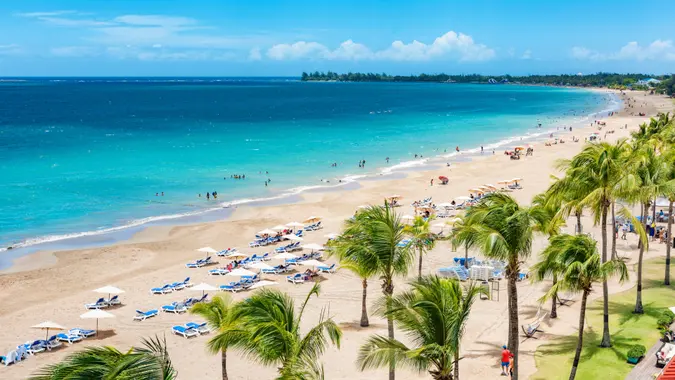5 Signs You’re Spending Too Much on Travel Expenses

Commitment to Our Readers
GOBankingRates' editorial team is committed to bringing you unbiased reviews and information. We use data-driven methodologies to evaluate financial products and services - our reviews and ratings are not influenced by advertisers. You can read more about our editorial guidelines and our products and services review methodology.

20 Years
Helping You Live Richer

Reviewed
by Experts

Trusted by
Millions of Readers
Travel can be exciting, and that excitement can sometimes lead to overspending. If you love to travel, you’ll want to be able to do it more often. Saving money while traveling can be a major part of sustaining your wanderlust.
It’s important to be aware of how certain travel expenses and choices you make during your trip can make it significantly more costly. Getting caught up in the excitement of the adventure can mask how much you’ve exceeded your budget.
Keeping the following signs in mind can be an easy way to spend less while maximizing your fun.
1. Prioritizing Luxury Over Experience
Sometimes, the finer things in life are worth the price. However, always choosing high-end accommodations or exclusive tour packages can quickly burn a hole in your wallet.
Whether it’s five-star hotels or first-class flights, luxury options for every aspect of your trip might not always align with your travel goals.
The key is balance. Sometimes, an inexpensive, boutique hotel or cozy Airbnb can provide the same level of comfort and convenience without a hefty price tag. Travel is more about the experiences than the thread count of a hotel’s sheets.
Making priceless, lifelong memories sometimes means spending less on the things that may not matter.
2. Ignoring Budget Constraints
Just because you’re far from home doesn’t mean you should abandon your regular spending habits or ignore a reasonable budget.
Not having a pre-set travel budget can lead to unnecessary purchases, and that can cause some unpleasant surprises at the end of your trip. The last thing you want to come home with is regret.
A flexible, well-planned budget will help you keep your trip enjoyable and financially responsible. Pre-planned expenses and set spending limits mean you’ll be sure to have enough funds to last for the entire trip.
This can keep impulse spending in check and can help you focus more energy on enjoying new experiences and creating memories.
3. Frequent Impulse Purchases
Souvenirs can be a wonderful reminder of a special trip, but you probably don’t need more than one or two.
Local markets with unique regional offerings can be lovely, but the temptation to buy interesting keepsakes can mean you spend more than you can afford. Because individually they can be small expenses, trinkets, fridge magnets and unnecessary snacks can seem deceptively affordable.
However, those small expenses add up over time and often don’t register until it’s too late. Setting a specific budget for souvenir shopping can help you avoid being swept off your feet by local charm.
Instead of buying everything that catches your eye, take pictures or keep a travel journal to document the memories. Your bags will be lighter, and your wallet will be heavier.
4. Overindulging in Dining Out
Travel and dining out go hand in hand, and it’s often a necessary expense that you have to take into account when budgeting your trip.
Fine dining is one of the great pleasures of traveling, but it’s important to moderate how frequently you indulge in high-end dining options. Eating every meal at an upscale restaurant can make you lose weight in the one place you don’t want to: your wallet.
Exploring markets or smaller, local-friendly eateries is an excellent way to find delicious and authentic food. These amazing culinary experiences can be yours at a fraction of the cost of higher-end dining options. Local grocery stores often have varied, unfamiliar and inexpensive options, as well.
If your accommodations allow you to cook during your trip, consider having a few meals in to save on costs. Packing snacks or sampling the local street food can also be enriching and enjoyable ways to taste local flavors without overspending.
5. Neglecting Long-Term Financial Goals
Traveling can provide a much-needed escape from day-to-day responsibilities and cares, but that intoxicating sense of freedom can make you overlook important long-term goals.
Sacrificing your savings to fund extravagant trips can have the long-term effect of financially handicapping you. For instance, maxing out credit cards can negatively impact your budget for months after a trip. Future goals like buying a home or retiring comfortably could be pushed back or even knocked out of reach by irresponsible spending habits.
Try to carefully balance your desire to travel with your other financial responsibilities and objectives. Credit cards with travel rewards might help you offset some costs, but they need to be used wisely to avoid high-interest charges that take a long time to pay down.
Sticking to a reasonable budget, as difficult as it might be in the moment, is one of the bests way not to jeopardize those long-term goals.
 Written by
Written by  Edited by
Edited by 

























